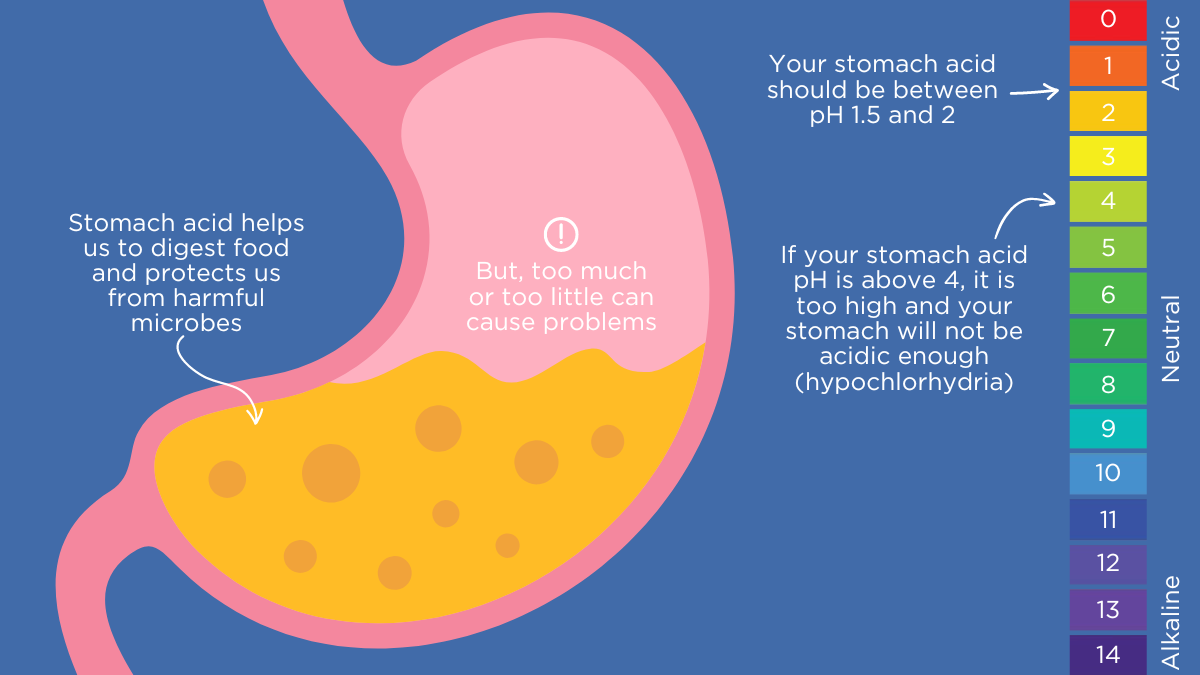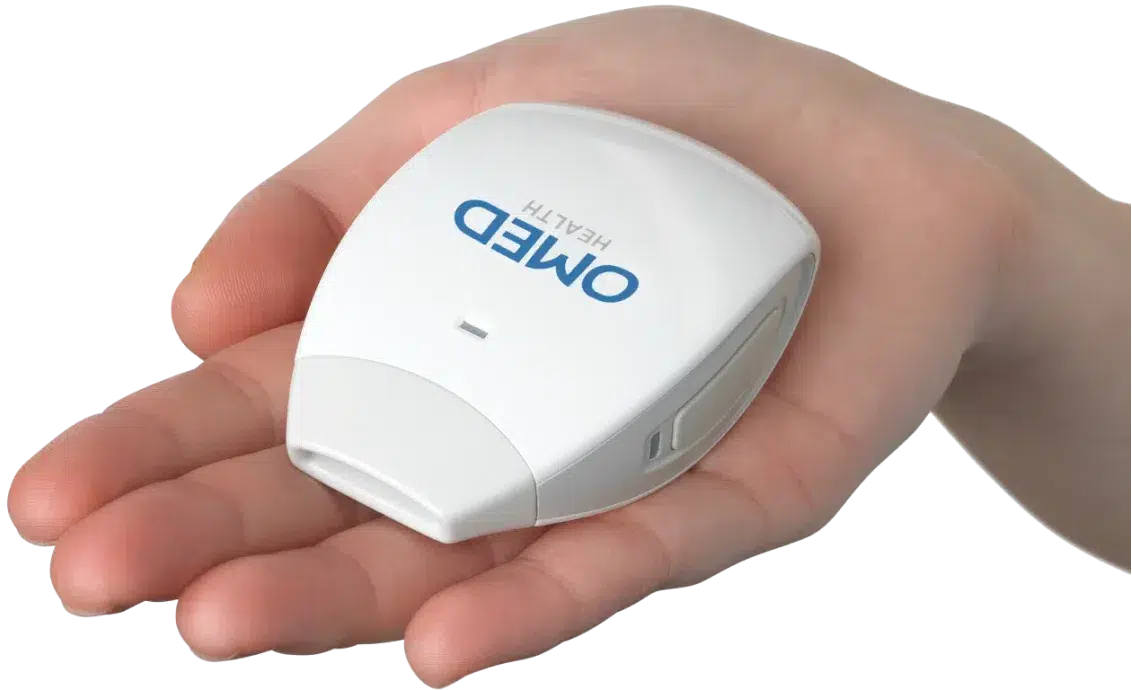Stomach Acid: What You Need to Know About Hypochlorhydria
Stomach acid, scientifically known as hydrochloric acid (HCl), plays an essential role in our digestive system, helping us to break down foods and providing protection from potentially dangerous bacteria. However, when stomach acid production is too low, a condition known as hypochlorhydria may develop, leading to uncomfortable digestive symptoms and potential health implications, although this is rare. In this article, we will explore the causes of low stomach acid, symptoms of low stomach acid and discuss other more common conditions with similar effects.
What is stomach acid?
Stomach acid is a digestive fluid produced by the stomach that helps break down food into smaller particles. It is composed primarily of hydrochloric acid, pepsin (an enzyme that breaks down proteins), and mucus. The acidic environment created by stomach acid also helps to kill harmful microbes, spores, and parasites that may be present in our food, reducing the risk of gastrointestinal infections (1).
Achlorhydria is the complete loss of stomach acid production while Zollinger-ellison syndrome is when the stomach to produce too much acid.
What is the pH of stomach acid?
The strength of stomach acid is measured using the pH scale, which measures the acidity of liquids. This scale ranges from 1 (most acidic) to 14 (least acidic, or alkaline). Stomach acid should have a pH of between 1.5 and 2 (2). Reduced stomach acid secretions lead to an increased pH (i.e., the stomach becomes less acidic and more alkaline). When the pH of stomach acid exceeds 4 it is considered to be too high and is referred to medically as hypochlorhydria. If the stomach is unable to produce any acid, it is called achlorhydria. This phenomenon is relatively uncommon, with an incidence rate of 2-5% (3).

Symptoms of low stomach acid
Hypochlorhydria symptoms acid include heartburn, bloating, gas, gut inflammation, and indigestion. However, symptoms can overlap with other digestive conditions like acid reflux, so if you experience these symptoms regularly it may be useful to speak with a healthcare provider to determine the underlying cause.
Most cases of heartburn and indigestion are not caused by low stomach acid but rather by a condition called acid reflux (gastro-esophageal reflux disease or GERD), which occurs when stomach acid flows back up into the esophagus (4). It is occasionally claimed that GERD occurs as a result of not enough stomach acid, although there is very limited evidence of this. The typical treatment plan for GERD includes proton pump inhibitors (PPIs, e.g., omeprazole) and antacids. PPIs act to block gastric acid release and offer effective GERD symptom relief. However, chronic use can cause low stomach acid (5). PPIs are one of the most frequently prescribed classes of drug worldwide, but studies consistently report that they are overprescribed (6).
Over time, low stomach acid may lead to nutrient deficiencies as many digestive enzymes, such as pepsin, are more active at lower pH and are therefore less efficient in a higher pH environment. Furthermore, a pH increase in the stomach renders the gastric environment less lethal to harmful microbes, increasing the risk of intestinal infections and small intestinal bacterial overgrowth (SIBO). If you think you might be suffering from SIBO, the OMED Health Breath Analyzer can help you get closer to a diagnosis.
We have recently launched our SIBO eBook, which explains more about SIBO, what causes it, how to know if you have it, and how to treat and prevent it from reccuring. You can download the free ebook here.
What causes low stomach acid?
Low stomach acid is relatively uncommon, and there has been little research on its underlying cause. Causes of low stomach acid may be age, autoimmune disorders damaging the stomach lining or thyroid, or the use of (PPIs), antacids and acid blockers (5). Helicobacter pylori infection is also a known cause of hypochlorhydria, due to the bacteria’s interference with the stomach’s acid-producing cells.
Low stomach acid tests
If it is thought that you are showing signs of low stomach acid, you may need a low stomach acid test. A gastric acid output test is often used. This is conducted with a capsule or probe and a pH sensor that is placed into the stomach. A standardised meal is given, such as a nutrient drink, that will buffer the acid levels in the stomach. The time it takes for your stomach to reacidify after the meal is then recorded.
How to increase stomach acid levels
If low stomach acid is diagnosed, you may be thinking, how do I increase stomach acid? It can be treated with supplements containing hydrochloric acid to lower the pH environment of the stomach, as well as digestive enzymes to help break down food properly. Apple cider vinegar has a similar pH to stomach acid, around 2.5, and there have been claims it can be a helpful treatment. However, further research is needed.
A diet for hypochlorhydria should include easily digestible foods, and in some cases, foods that help stimulate stomach acid production, such as ginger or apple cider vinegar, may be beneficial. Consulting with a healthcare provider can guide dietary changes for managing low stomach acid effectively.
While low stomach acid is a real condition, it is relatively rare and is not the origin of most digestive symptoms. If you are experiencing persistent heartburn, indigestion, or other digestive symptoms, it is important to speak with a healthcare provider to determine the underlying cause and develop an appropriate treatment plan. You can now purchase your OMED Health Breath Analyzer and Plans, which allows for long-term, at-home monitoring and treatment for SIBO and IMO.
References
- Hunt RH, Camilleri M, Crowe SE, et al. The stomach in health and disease. Gut. 2015;64(10):1650. doi:10.1136/GUTJNL-2014-307595
- Fujimori S. Gastric acid level of humans must decrease in the future. World J Gastroenterol. 2020;26(43):6706-6709. doi:10.3748/wjg.v26.i43.6706
- Fatima R, Aziz M. Achlorhydria. South Med J. 2023;21(11):920-924. doi:10.1097/00007611-192811000-00010
- Wang KK, Genere JR. Gastroesophageal Reflux Disease (GERD). Mo Med. 2018;115(3):214. doi:10.1016/B978-0-12-801238-3.65937-8
- Freedberg DE, Lebwohl B, Abrams JA. The impact of proton pump inhibitors on the human gastrointestinal microbiome. Clin Lab Med. 2014;34(4):771. doi:10.1016/J.CLL.2014.08.008
- Forgacs I, Loganayagam A. Overprescribing proton pump inhibitors. BMJ : British Medical Journal. 2008;336(7634):2. doi:10.1136/BMJ.39406.449456.BE





